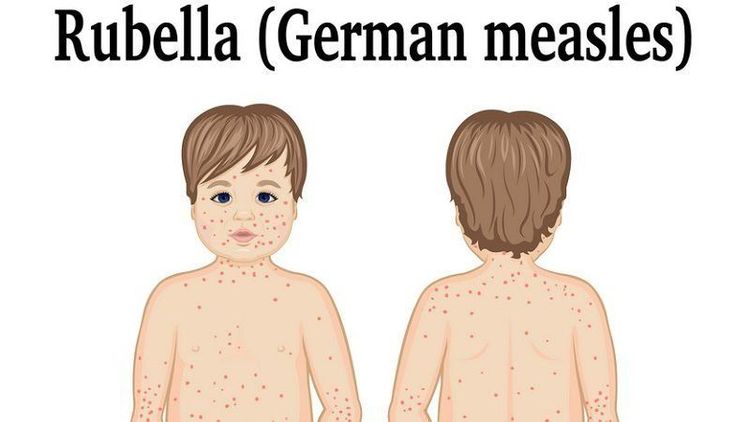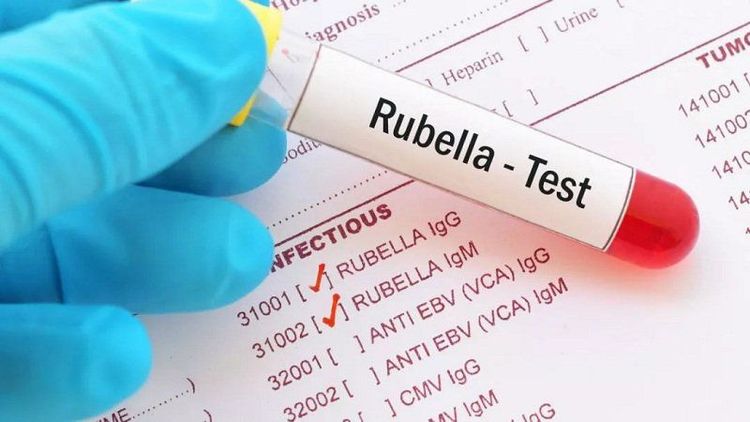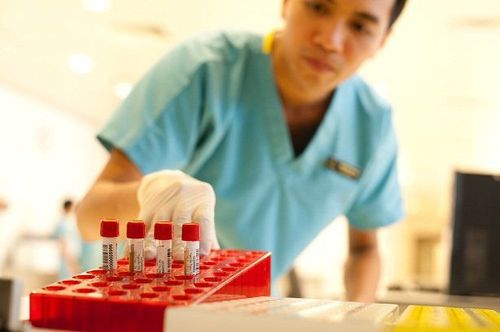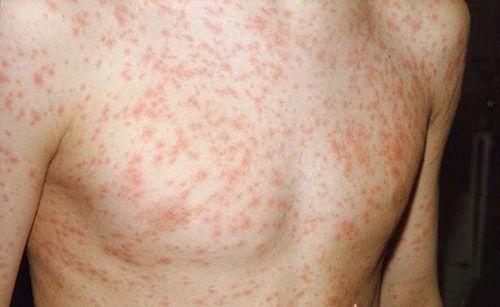This is an automatically translated article.
Articles by Dr. Tran Thi Phuong Thuy - Hepatobiliary specialist - General Internal Medicine - Vinmec Times City International Hospital
Rubella is transmitted through the respiratory tract, when inhaling droplets from the nasopharyngeal secretions of an infected person. Drops of this virus can also fall on the surface of the skin, clothing, and objects around the sick person. If you have never had rubella or been vaccinated, you can get the virus from close contact with an infected person.
1. What is rubella?
Rubella is an infection that causes a red rash on the face and body. This disease is caused by infection with the rubella virus, it is also known as "German measles".
In the past, measles and rubella were quite common and sometimes caused epidemics. Today, widespread production and vaccination of the measles-mumps-rubella (MMR) vaccine with an expanded immunization program for children and adults has greatly reduced the incidence of this disease. By the end of 2018, 168 countries around the world had included rubella vaccine in the expanded immunization program, including Vietnam. In addition to preventing rubella infection, this vaccine can also protect the body from two other diseases, mumps and measles.
Currently, there is also a new combination vaccine, in addition to preventing the 3 diseases mentioned above, it also prevents chickenpox - a disease caused by the varicella virus.
Rubella can be very dangerous to an unborn baby. If a woman contracts rubella during pregnancy, the fetus is at risk of premature birth or death. The baby can be born with serious birth defects, including:
Deafness Eye defects Congenital heart disease Mental retardation Physical retardation The possibility of mother-to-child transmission of the virus and complications to the fetus will depend on the duration of rubella infection during pregnancy. The baby is more likely to have these birth defects if the mother is infected with rubella during the first half of pregnancy (first 20 weeks).
2. What are the symptoms of rubella?
Symptoms of rubella are usually mild, clinical manifestations in children and adults are not the same. In children, common symptoms include:Skin rash - skin rash appears first on the face, then that spreads throughout the body within 24 hours. The rubella skin rash will usually go away within 3 days. However, this rash can last longer, about 8 days. Some children will have itchy, red eyes, Forschheimer's sign (bleeding spots or dark spots on the roof of the mouth). Mild fever Swollen lymph nodes

In adults, when infected with rubella, there are manifestations such as:
Skin rash, fever, swollen lymph nodes – these symptoms are similar to children. Fatigue, flu Pain in the joints – usually in the joints of the knees, wrists and fingers. Joint pain is more common in adolescents and women than in men. Joint pain may persist for a month or longer, even if the rash has disappeared. Itching, red eyes Pain and swelling of the scrotum (in men) Adults often have more aggressive clinical manifestations than children.
3 How is rubella transmitted?
Rubella is transmitted through the respiratory tract, when inhaling small droplets from the nasopharyngeal secretions of an infected person (similar to influenza). Drops of this virus can also fall on the surface of the skin, clothing, and objects around the sick person.
If you have never had rubella or been vaccinated against it, you can contract the virus through close contact with an infected person. More specifically, you can be exposed by direct contact (talking, facing an infected person coughing, sneezing) or by touching people or objects that the sick person has touched. If you or your child has rubella, you will usually be advised about preventing the spread of rubella in the community as follows:
Keep your child home for 7 days after the rash appears Wash your hands often or use alcohol-based hand sanitizer hand.
4. What tests are there to diagnose rubella?
Your doctor can test for rubella virus in your blood. However, most patients do not need this test. The doctor will usually diagnose the disease on the clinical basis, through examination and questioning without the need for testing.
If the doctor suspects that the infant has rubella, the doctor will do a blood test to make the diagnosis. Because whether in adults or children, in cases of clinical doubt or uncertainty, a blood test for rubella will help support a more accurate diagnosis. If you are pregnant and think you may have rubella, you should be tested to confirm the diagnosis.

5. How to treat rubella?
There is no specific treatment for rubella, treatment is mainly to relieve symptoms. Most cases will clear up on their own without any treatment.
You or your child can take medicines to relieve symptoms, such as fever. However, you absolutely should not give aspirin to children under 18 years of age. In children under 18, aspirin can trigger a dangerous condition known as Reye's syndrome.
6. Can rubella be prevented?
Rubella vaccine can prevent disease. All children should be vaccinated against rubella between 12 and 15 months of age. After that, children should receive a second dose when they are 4-6 years old. All children should receive a second dose of the vaccine before going to school.
For adults who are not vaccinated against rubella according to the national immunization schedule for children, these should receive at least 1 dose. This dose of vaccine is extremely important for women planning a pregnancy.
Rubella vaccine is contraindicated in pregnant women, so getting vaccinated before pregnancy is very important and will help reduce the risk of rubella during pregnancy.
Under certain circumstances, it is not safe to get the rubella vaccine. This is because these people's bodies have trouble making antibodies against foreign infections, when they:
Are being treated for cancer Receive an organ transplant (such as a liver or kidney transplant ) and are taking drugs to prevent the body from rejecting the transplant Immunodeficiency
7. If I want to get pregnant, what should I do to avoid getting rubella?
If you want to get pregnant, make sure your vaccine is still effective. If you're not sure if you've ever had the rubella vaccine, see your doctor for a blood test.
Rubella vaccine must be given before pregnancy and pregnancy should be at least 4 weeks from the date of vaccination.
In summary, Rubella is a dangerous disease and can leave many complications, but it can be prevented by vaccination with the Measles-Mumps-Rubella vaccine. Therefore, to ensure safety, you need to choose a reputable medical facility and have good vaccination services.
Vinmec International General Hospital provides measles - Mumps - Rubella vaccination service with the following advantages:
Customers are fully examined and screened for health problems, receive advice on vaccines used, injection regimens, monitoring and post-injection care according to the latest recommendations of the Ministry of Health and the World Health Organization; Having a team of experienced and highly qualified medical staff, applying effective pain relief measures during and after vaccination; 100% of customers are monitored for health 30 minutes after injection and reassessed before leaving; There is an emergency team ready to coordinate with the vaccination department to promptly handle cases of anaphylaxis, respiratory failure - circulatory arrest after injection according to the correct regimen when something goes wrong; The vaccination room is clean and airy, creating a comfortable feeling for customers; Vaccines are imported and preserved at a modern cold storage system with a cold chain that meets GSP standards, ensuring that vaccines are kept in the best conditions; For customers who are children, parents will receive a message to remind them of the vaccination schedule, and the hospital will synchronize their child's vaccination information with the national immunization information system.
Please dial HOTLINE for more information or register for an appointment HERE. Download MyVinmec app to make appointments faster and to manage your bookings easily.
Reference source: update.com














